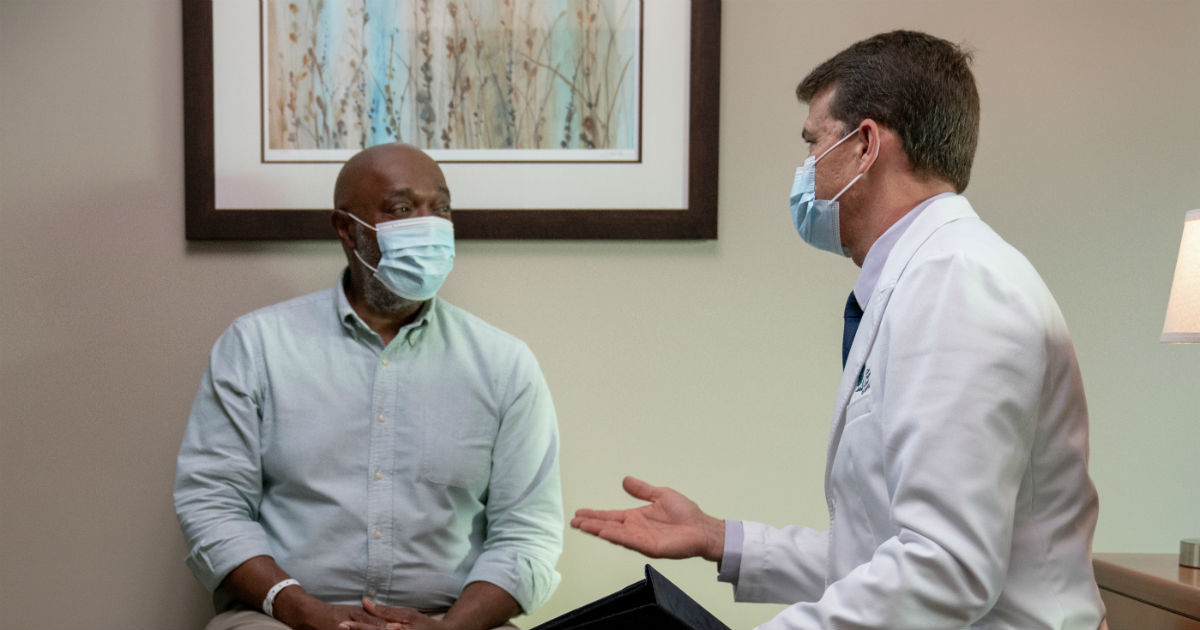
If you are a man in a room with 99 other men, chances are 12 of you will be diagnosed with prostate cancer at some point in your lives. But the statistics also say that there’s a good chance all 12 of you may still be alive five years after your diagnoses, thanks to increased awareness, early detection and advances in treatment.
Consider these National Cancer Institute statistics:
- The five-year survival rate for prostate cancer is 97 percent, nearly 100 percent when the cancer is diagnosed at an early stage.
- The number of new prostate cancer cases has fallen from 234 per 100,000 men in 1992 to 108 in 2017.
- The number of prostate cancer deaths has fallen from 39 per 100,000 in 1992 to 19 in 2018.
More treatment options are now available for prostate cancer than ever before. And advances in surgery and radiation therapy, two of the most common treatments for the disease, are designed to produce fewer side effects and more positive outcomes.
Treatment for prostate cancer depends on many factors, including the stage, type and location of the disease. But with more treatment options come more questions. Here are the answers to six common questions about prostate cancer treatment:
What is active surveillance?
When you receive a prostate cancer diagnosis, your natural inclination may be to remove the cancer immediately. But not all prostate cancers are aggressive, and many do not spread at the same rate. For some patients, the recommended treatment may be to keep a close eye on the disease, through a strategy known as active surveillance. Learn how TV weatherman Al Roker was treated for prostate cancer.
Active surveillance may be recommended for patients with:
- A small tumor that is confined to the prostate
- A slow-growing type of prostate cancer
- A cancer that is at low risk of growing locally or spreading
Active surveillance is not the recommended treatment for every patient with localized prostate cancer. A number of men, given the possibility that the cancer could become more aggressive, prefer to eliminate even the smallest tumor and accept the risk of side effects from treatment. It’s a personal decision, so it’s important to understand your options and identify questions or concerns you have.
Should I consider surgery?
Candidates for surgery to treat prostate cancer have one or more of the following characteristics:
- Overall good health
- No spread of cancer to bone
- Tumor confined to the prostate gland
- Under the age of 70
- Expected to live another 10 years or more
Most surgeries to treat prostate cancer are radical prostatectomies, removing the entire prostate gland. Using a robotic surgery system offers a minimally invasive alternative to open surgery. Robotic surgery requires only a few tiny incisions and is designed to offers surgeons better vision, control and precision. Patients often recover sooner after robotic surgery.
Some advantages of prostate cancer surgery include:
- Patients with localized cancer may need no further treatment.
- Simultaneous biopsy allows for more accurate staging.
- Patients may have a lower risk of urinary urgency and frequency than with radiation treatments.
Some disadvantages of surgery for prostate cancer include:
- Prostate cancer surgery requires general anesthesia.
- Surgery likely will require an overnight stay at the hospital.
- A catheter may be required for required for one or two weeks.
- Side effects may include changes in sexual function.
Is radiation therapy an option for me?
Radiation therapy uses targeted energy, similar to X-rays, to kill cancer cells, shrink tumors and provide relief of certain cancer-related symptoms. Radiation may be used instead of surgery in men with early-stage prostate cancer that has not spread to other parts of the body. It may also be used in combination with surgery to assist in removing cancerous tissue.
Radiation oncologists use a variety of therapies and tools designed to deliver high radiation doses to tumors, with less damage to healthy tissues and organs. Focusing the radiation directly on the tumor may lower the risk of side effects. Radiation therapy options for prostate cancer includes external beam radiation therapy, stereotactic body radiation therapy, high-dose rate brachytherapy and low-dose rate brachytherapy.
How does hormone therapy work?
Male hormones (androgens, the most common of which is testosterone) typically fuel the growth of prostate cancer. Hormone therapy for prostate cancer is designed to decrease the body’s levels of androgens (called androgen deprivation therapy, or ADT) and shrink the size of the cancer in the prostate as well as other areas it may have spread to (a process called metastasis).Hormone therapy may include drugs that prevent the testicles or other glands from producing hormones, or it may be given in combination with an orchiectomy, the surgical removal of one or testicles designed to reduce the amount of testosterone being produced.
Possible side effects of hormone therapy include:
- Loss of sex drive
- Erectile dysfunction
- Loss of muscle mass
- Hot flashes
- Loss of bone density
Can I treat my prostate cancer with chemotherapy?
Chemotherapy is not a common treatment for prostate cancer, but it may be used if cancer has spread outside the prostate gland and hormone therapy has been unsuccessful. Typically, chemotherapy drugs for prostate cancer are given intravenously (injected into a vein). Doctors give chemotherapy in cycles, with each period of treatment followed by a rest period to allow the body time to recover. Each cycle typically lasts for a few weeks.
Am I a candidate for immunotherapy?
Two types of immunotherapy may be used to treat prostate cancer:
The Sipuleucel-T vaccine: This vaccine (Provenge®) may be an option to treat advanced prostate cancer. Sipuleucel-T is made by re-engineering a patient’s immune cells to recognize and attack prostate cancer cells.
Checkpoint inhibitors: These drugs are designed to strip away cancer’s ability to hide from the immune system at certain “checkpoints” T-cells use while patrolling the body for diseased or damage cells. While these drugs have not been approved specifically for use on prostate cancer, they are approved for cancers with specific genetic features, which may include some prostate cancers.
In cases of metastatic prostate cancer, immunotherapy may be recommended as a second-line treatment for patients who have not gotten results with hormone therapy.


